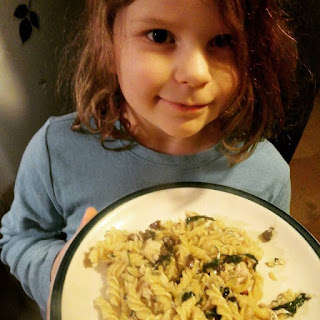Recipe for Learning
In the waiting room at the doctor's office, Alia, age seven, watched a cooking show on the tv near the kids' area. I missed the first five minutes of one of the segments while I was checking her in, and as the chef was finishing up a dish, I commented that it looked really tasty. Alia asked if she could make it for dinner sometime, and I was excited at the idea. On the way home, we stopped for the ingredients we didn't have at home, but needed - spinach and mushrooms - and planned to make the dish the next night.
The next evening, Alia cut mushrooms, chopped spinach, delegated the garlic mincing to me, and put pasta on to boil. She recreated a wonderful spinach, mushroom, chicken, and pasta dish quite successfully, It was such a big hit with nearly everyone in our family, she ended up making in two more times during the following week.
In a recent discussion with an acquaintance about homeschooling, she asked how my kids could possibly learn if we didn't make them memorize things. Facts and figures are, according to her, integral in life. I asked her to please tell me how she used the date of the start of the Civil War, the names of the presidents from George Washington to the present, and the names of the capitols of every state in the U.S.A. for something constructive recently. I received a blank stare in reply. She admitted she doesn't even use her times tables, which she stressed so much about memorizing in elementary school, because whenever she needs to do math, she uses the calculator on her phone.
My response included that my children do math in their heads, including hundreds and thousands, with ease because they enjoy playing games like Magic the Gathering that require quick calculations. They manipulate fractions when baking and cooking, are familiar with where all the states in the US are located due to a game called Mad Dash, and know a fair amount about science and history through museum and science center visits, visits to historic sites, and discussions with people who lived through major and minor historical happenings in our relatively recent past. My children also memorize lines for theatrical performances in which they choose to participate, and songs for church choir.
And they watch a cooking show on tv, memorize the ingredients and steps on the spot, have the real life cooking experience due to years of helping or being in charge in the kitchen, and recreate the dish with ease and minimal help - no recipe required.





Omg I love this post! I've been asked the same questions because we follow the same philosophies as you. Well said!
ReplyDelete